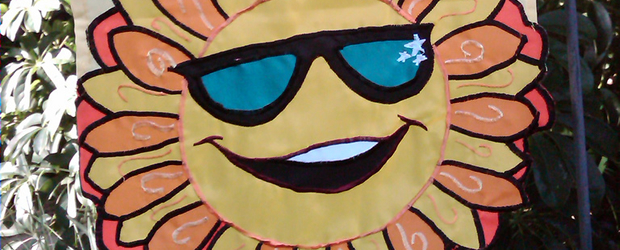The news shows images of bare skin and laced sunglasses, everyone is ecstatic at the bakery: the weather is GOOD, it’s SUNNY, it’s almost the holidays (almost).
You know what ? We are about to add a layer: What effects does the sun have on our behavior? Are we happier when it shines?
The sun would make us friendlier

In Brain and PsychoNicolas Gueguen has dedicated an article to the subject.
According to the researcher, the sun’s rays could well motivate our propensity to help others and foster social relationships : we gave more to beggars in summer and spring than in autumn or winter, we agreed to pick up hitchhikers more often when the sky was clear (at the same temperature, we stopped more often when it was sunny), …
To illustrate his point, Gueguen cites an experiment conducted by Michael Cunningham.
In it, Cunningham would approach people on the street and ask them to answer a list of 80 questions for a University sociology department survey.
Its purpose: to observe the number of questions that the participants undertake to answer and to study a possible link with the weather (monitoring of meteorological parameters and measurement of sunshine).
The survey was carried out in different meteorological conditions (temperature variations). POOF: The brighter the sun, the more questions subjects answer – whatever the temperature.
In other words, the sun, and not the temperature, could affect our behavior and make us more collaborative!
When the the sun shinespositve thinkings

The “sun” effect can be explained by rebounds: the sun could positively influence our mood, which could in turn influence our tendency to be understanding and see life in pink…
With the aim of evaluating the impact of time on our affects, Jaap Denissen (2008) provided individuals with comprehensive scales describing positive (enthusiastic, determined, etc.) and negative (irritable, sad, etc.) aspects of mood. ).
The researcher then compared the meteorological parameters (wind, rainfall, pressure, degree of insolation): according to his analyses, the stronger the sun, the more positive mood scores would increase – an effect that is not necessarily found for other meteorological factors.
In his journal, Gueguen even indicates that when the weather is nice and we smile at passers-by, they would smile at us more often – YES, PERFECTLY: when it’s gray, we’d be a lot more pissed off.
The fact is that for the effect to appear, we should be aware of the presence of the sun, or at least perceive it: if the dance of smiles takes place in a room… the n effect is more observable, and the smile is the rate of return goes down.
But why ? For Nicolas Gueguen, the effect could be attributed to the well-being aroused by the sun… Sun = well-being = positive reactions, youplaboum and picnics in the parks!

Monsieur Soleil inhaled too much chamomile tea, I think.
A study by Howard and Hoffman (1984) also concludes that the weather has an effect on our moods. The two researchers asked 24 college students to fill out a questionnaire to rate their mood for 11 consecutive days. Verdict: mood is in fact related to the weather – and in particular to the level of humidity.
The more humid the climate, the less our ability to concentrate and the more we would like to sleep…
For his part, Faust (et al., 1974) analyzed the mood of 16,000 students. Many of them respond negatively to certain weather conditions.
For example, dullness would push us to be a little depressed, to be more irritable than usual…
Keller (et al., sai, 2005) mobilized 605 participants in 3 different studies to observe the links between mood, thoughts and time.
According to the results of these studies, pleasant weather is associated with a better mood and more positive thoughts ; at least in spring (in summer, it would seem that our mood is less good, perhaps due to the “too” hot climate).
Conversely, feelings of sadness and depression would arise as the days get shorter, the amount of sunshine decreases, and temperatures drop…
HEY, let’s not set fire: the sun won’t necessarily make you indestructible beings, happy to eat hay and smile at the first arrivals.
Some studies even mitigate the supposed effect of sun and weather on humans. For example, Hardt and Gerbeshagen (1999) studied 3,000 chronic pain patients who visited the hospital over a 5-year period.
During the visit, the patients filled out a questionnaire assessing their states of depression. After the analysis, the researchers find no correlation between the time of year, the number of hours of sunshine per day and depressive states…
What if the weather affects our seriousness?

There are not only smiles and good humor in life, even if it makes everyday life much more beautiful. Uri Simmonsohn (et al.) then examined the impact of the sun on college student enrollment.
Imagine that if the visit to the university took place in gray weather, future students would enroll more in a university renowned for its training and academic content…
And vice versa, when the visit takes place on a sunny day, the subjects would enroll more in a university that offers recreational activities.
Similarly, Simmonsohn analyzed the recommendations made by evaluators on questions from students applying to a university (each question is studied by two people who recommend or not the candidate’s admission) and compared these recommendations with meteorological data .
The observation is similar: when the sun is shining, the evaluators focus their recommendations on non-academic data (sports, hobbies), while when the sky is gray, they rather consider academic data (grades, mentions).
The sun would encourage generosity… and spending

This time the research is led by psychologist Bruce Rind.
The experiment takes place in a hotel with opaque windows (which do not let in any information on the presence or absence of the sun outside), with customers having breakfast in their room, without knowing what the weather is like.
Let’s save ourselves this: the waiter or waitress might increase their tips just by mentioning the sunny weather!
Indeed, when the server tells customers he’s nice, tips average 24% of the billwhile I’m at 19% rating when mentioning rainy weather…
Not only that: the weather could also influence our consumption behavior (in turn, the weather would influence mood, which would affect consumption).
Murray, Di Muro, Finn and Popkowski Leszczyc undertook 3 experiments to test a potential causal relationship between the sun, negative effects and consumer spending.
In the first, the team looks at a tea shop’s daily sales over a 6-year period, as well as daily weather data over the same period (temperature, rain, snow, humidity, wind, pressure, sunshine…).
Result: when the temperature is low, the presence of the sun would go hand in hand with an increase in sales.
In the second, Murray and his colleagues asked 33 people to keep a daily diary of their consumption behavior (purchases of tea, coffee, etc.) and their moods for 20 consecutive days. Daily weather data is matched.
Here, the sun’s rays would seem to cause a reduction in negative moods and an increase in spending of the consumer.
Finally, in the third, 78 participants provide information on how much they would be willing to pay for X quantity of 5 products (tea, orange juice, fitness center membership, etc.).
Participants are in a room with a lamp or a room with no light source. The moods of the subjects are measured (using a mood scale).
bam: people exposed to the light source would be willing to pay more than others for the 5 products…

We saw a lot of things, a series of potential effects of the sun, the light, the humidity…
Mais somme toute, ce dont nous sommes sûr-es, comme toujours, c’est que nous ne sommes sûr-es de pas grand-chose : s’il existe un lien entre la météo et nos comportements, quel force at- he ?
Are these effects similar elsewhere, in other countries, in other continents, in other climates? Is it enough to believe that “the weather is good” for the effects to exist?
At the risk of sounding like a fool, we too hesitate: the sun is fantastic, it makes you want to go out, fall asleep outside, stay in the sun…
But the sun can also be a danger to your health : protect yourself, cream, beware of overexposure – we don’t care about tanning (I swear, I don’t say it because I’m translucent all year round), take a look at this or the testimony of a sun allergic madmoiZelle.
For further :
- The sources – Psychocentral, Brain and Psycho, Psychology today, Journal of Personality and Social Psychology
- A study that provokes “sun haters” here and there
Source: Madmoizelle
Mary Crossley is an author at “The Fashion Vibes”. She is a seasoned journalist who is dedicated to delivering the latest news to her readers. With a keen sense of what’s important, Mary covers a wide range of topics, from politics to lifestyle and everything in between.




